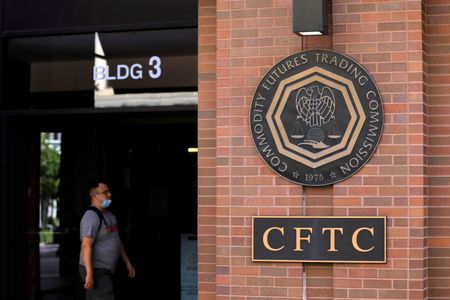By Laura Matthews
NEW YORK (Reuters) -The U.S. Commodity Futures Trading Commission (CFTC) on Friday proposed a rule that would ban listed derivatives used to bet on U.S. elections and other major real world events.
The CFTC voted in favor of the proposal, with three commissioners supporting it while two did not back it, in part, on concern that it could encroach on states’ ability to regulate gaming.
The proposed regulations bans the listing and clearing of so-called “event contracts,” a type of futures contract which have proliferated in recent years. Critics have said the products could undermine the integrity of U.S. elections.
“Such contracts not only fail to serve the economic purpose of the futures markets — they are illegal in several states and could potentially and impermissibly preempt State responsibilities for overseeing federal elections,” CFTC chair Rostin Behnam said in a statement ahead of the vote.
The proposal, which comes in a major presidential election year, would ban “gaming” derivatives, which would also cover products that allow bets on sporting events, as well as calamities such as terrorism and assassination, the chair said.
But commissioner Caroline Pham said the proposal “bigfoots into state regulation of gaming by drawing unintelligible lines in the sand,” which could confuse state gaming authorities, or push trading of those contracts into unsafe offshore markets.
The proposal comes after the CFTC was sued by online marketplaces, including PredictIt, which the CFTC tried to shut down, and New York-based exchange KalshiEx, whose application to list event contracts was rejected.
Tarek Mansour, CEO and cofounder at Kalshi, told Reuters he looks forward to continued engagement with regulators and Congress to ensure customers “can participate in legitimate trading” on a regulated exchange.
Cantrell Dumas, director of derivatives policy at Better Markets, a nonprofit promoting public interest in financial markets, applauded the CFTC for taking steps to clarify and strengthen the rule around these contracts.
“Gambling on elections is unacceptable for many reasons, including that it will likely incentivize election interference, further erode Americans’ trust in elections, and threatens investors with an inevitable onslaught of predatory platforms designed to lure them in to a manipulated market,” said Dumas.
(Reporting by Laura Matthews, Editing by Nick Zieminski and Chizu Nomiyama)
Brought to you by www.srnnews.com





